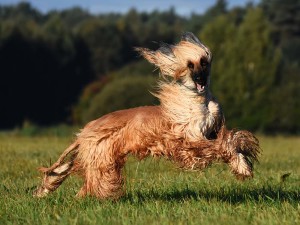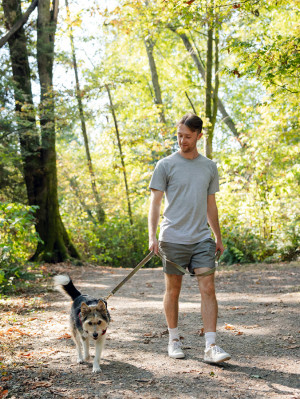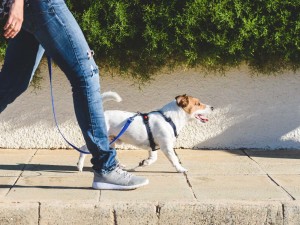How To Deal With A Food-Motivated Dog During Picnic Season
There is nothing more humbling than apologising to a stranger in the park while your dog nibbles on their sausage roll

Share Article
Picture the scene: it’s finally over 23C in the UK, you’ve got everyone together for a barbecue or picnic down the park, and you’ve decided to bring your favourite good boy or girl along to make some new friends. Maybe they’ve never been in this situation before, but you think you can trust them – after all, they passed their training coursesopens in a new tab. But then, before you can step in, they’ve nicked a sausage off your friend’s plate. Or, even worse, they’ve run off and rampaged through someone else’s picnic – someone who’s not the biggest fan of dogs in the first place.
Maybe you just didn’t realise quite how food-motivated your dog is. After all, they might not beg much at home and you don’t have to lock up the human treats. But now they’ve snatched someone’s lunch, and in between profusely apologising and offering bribes, you’re wondering what to do. First off, don’t be too embarrassed. Pretty much all dogs are food-motivated, which can come in handy when training. However, when food-motivated dogs get overstimulated or overexcitedopens in a new tab, it can lead to them become impatient.

littleKin™ is Kinship’s home just for puppy and kitten parents. Bop over to check out expert advice, new pet tools, and special deals—all curated for your newest family member.
opens in a new tabCan I teach my dog to be chill around food?
That doesn’t mean avoiding the park all summer, but it might take some work to get your dog under control and make sure they won’t show you up.
Firstly, you need to practise some restraint around food. Dog behaviour expert and trainer Sally Barnesopens in a new tab says that starts with not treating your dog all day at home – it’s a fine line between training with treatsopens in a new tab and getting them to expect or rely on them. Lauren Hewitt-Wattsopens in a new tab is an APBC-certified animal behaviourist and the founder of Dog Mum Mindset, an online dog training platform. She adds that it’s essential to instil restraint.
“Practice some loose lead walking around boring food, like their dry food, and rewarding with very high-value food like chicken,” she says. Most importantly, says Lauren, you need to get your dog to respond to ‘leave itopens in a new tab’, no matter how enticing the snack. Once that’s in place, barbecues should be less stress.
In the height of summer, the park or a busy back garden can be overstimulating for anyone, especially dogs. No matter how well they behave on their normal walksopens in a new tab, it can be hard to predict how they’re going to respond to a hectic park. Lauren says that this is no reason to stay away, so long as you get some basics in place. “Make sure they are well fed and well exercised before you enter the park,” she says.
The likelihood is that if you show up to the park and just sit down without a full walk, they’ll be full of nervous energy and expecting more exercise. When picking a spot, try to find somewhere out of the way. “Try and make sure people can’t approach your dog without your consent. Sitting by a tree or sticking to the edge of the park will help,” says Lauren. Having a long lead can help your dog to find space to themselves, but overall, Lauren says you just need to stay alert and keep an eye on your surroundings.
On a busy day, even the best-behaved dogs might be at risk of running off and disrupting someone’s picnic. Sally says that it’s important to remember that not everyone is as big a fan of your dog as you are. “Picnickers and walkers should not have to tolerate strange dogs coming into their space,” she says, adding, “if you have not got complete control of your dog anywhere and everywhere, they should never be off-lead.”
You could easily get into an argument with someone if your dog bothers them, and you run the risk of getting into trouble. “It’s really bad manners to have your dog steal from a picnic and instances like this are what cause councils to stop dogs in parks or have lead restrictions,” says Lauren. “It could also scare someone if they aren’t used to dogs, which could even land you in trouble with the police.” Not only that, but your pet might run across another dog at another barbecue or picnic who’s feeling territorial and get into an altercation.
How do I know if my dog is stressed out or overstimulated?
You know your dog better than anyone, and you should be able to look out for signs that they’re becoming overstimulated or stressed outopens in a new tab. That said, according to Lauren there are sure signs for all dogs that you can look out for. “If they are not listening to you like they normally do, then they are probably overstimulated and need some down time. If your dog is giving the classic stress signals, it is also time to go,” she says. These include heavy panting, showing the whites of their eyes, pinned back earsopens in a new tab, yawning and hyper-vigilance.
“If your dog is barking or whining, becoming reactive or they are unable to stop playing with other dogs, they need a break.” If you’ve never been to a barbecue or picnic with them before, try to keep it short or not go too far from home so that you can easily get them back to safety.
What other risks are there for dogs during barbecue and picnic season?
There are many risks to dogs if they’re left unsupervised at barbecues and picnics – getting burnt, making other people angry, getting into fightsopens in a new tab. One of the main risks is the food itself.
“Human food can be very dangerous for dogs,” says Sally. It’s not only about obvious toxic foods like chocolateopens in a new tab and grapesopens in a new tab. Cooked bones, which can often be found at barbecues, are very dangerous and can get stuck. Corn on the cob is also dangerous as dogs cannot break down the middle part. Onionsopens in a new tab and garlic are present in all kinds of summery foods – sausages, dips, coleslaw. Basically, it’s safer to make sure they don’t eat anything out and about. Restricting their food out of the house will have the added impact of reinforcing that they shouldn’t be taking anything that isn’t theirs.
With all those risks, is it safer to just avoid busy places like beachesopens in a new tab or parks on scorcher days? Lauren says that sometimes just letting them chill at home is safer. “Even as a dog behaviourist with 10 years’ experience and a dog that is a very good boy, I still would not take him on a picnic to super busy parks on peak days,” she says. “He would be too hot and I am too aware of the things that can go wrong when you have lots of hot, overstimulated and tired dogs in one place.”
Lauren suggests enjoying the picnic or barbecue fully on your own and then going for a cool, calm walk later in the evening. If you do have to take your dog with you, make sure to take precautions so you can avoid the awkwardness of trying to reimburse a stranger for some sausages.

Marianne Eloise
Marianne Eloise is a writer for outlets like The Cut, the Guardian and the New York Times. She is also the author of an essay collection Obsessive, Intrusive, Magical Thinkingopens in a new tab. She has been going on adventures with her dog Bowie since she was 17.
Related articles
- opens in a new tab
When is it Too Hot to Walk Your Dog?
How to keep your dog safe, happy and active all summer long
![Shepherd dog playing with yellow ball at the beach]() opens in a new tab
opens in a new tabIs My Dog Allowed On The Beach?
Check the rules before heading out…
![Avoid heat stroke in dogs by sprinkling in the backyard with your dog]() opens in a new tab
opens in a new tabHeat–Stroke in Dogs: Signs, Treatment & Prevention Expert Advice
How to take precautions for your pup when temperatures rise
![Dog walker walking with her pet on leash on the sidewalk]() opens in a new tab
opens in a new tab10 Tips You’ll Definitely Want to Follow When You Walk Your Dog
From the safest gear to training recommendations






